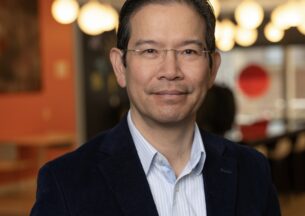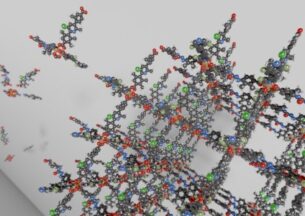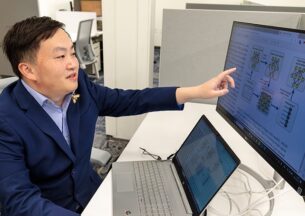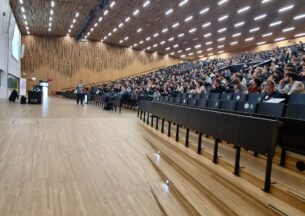In-Fridge Controller Could Scale Up Quantum Computers, Award-Winning UChicago Research Finds
A collaboration between computer scientists and physicists at the University of Chicago broke through one of the key obstacles for large-scale quantum computing by figuring out how to move their control signals “inside the fridge.”
Current quantum chips must be stored at extremely cold temperatures inside a dilution refrigerator, but are controlled by signals from a classical controller at room temperature. The costs and hardware required for this setup limits the scalability of the technology, which will be necessary to capture this new technology’s enormous potential for cryptography, molecular simulation, and other applications.
The UChicago research team demonstrated low-error two-qubit operations using Superconducting Single Flux Quantum (SFQ) pulses, which are voltage signals generated inside the fridge. The finding is an essential step to realize universal quantum computing at large scales.
The interdisciplinary research was conducted as a part of the Enabling Practical-scale Quantum Computation (EPiQC) project, an NSF Expedition in Computing. The research was recently published in the 2021 IEEE International Conference on Quantum Computing and Engineering (QCE), where it received a Best Paper Award. The authors of this paper are Mohammad Reza Jokar, Richard Rines, and Frederic Chong.
Towards large-scale quantum machines
Superconducting quantum computing is one of the leading technologies to realize quantum computers. Small quantum computer prototypes based on this technology with up to around 100 qubits have been manufactured in recent years thanks to efforts in industry and academia. The quantum chip in these prototypes is located inside a dilution refrigerator at millikelvin temperature, and quantum operations are performed by sending microwave control signals for each qubit from a classical controller at room temperature. Unfortunately, this control approach has severe scalability challenges due to the massive energy costs of generating the microwave signals at room temperature and routing them to the quantum chip using coaxial cables.
To address these scalability challenges, one solution proposed in the literature is to generate and route the control signals locally inside the quantum fridge. SFQ is a classical logic technology that can operate inside the quantum fridge with very low power consumption, thus enabling an in-fridge controller with maximized scalability. Prior work used a genetic algorithm to find SFQ pulse trains that implement single-qubit operations with low error using SFQ pulses. However, little research has been done on SFQ-based two-qubit operations, which are essential to realize universal quantum computing.
SFQ-based two-qubit operations with low error
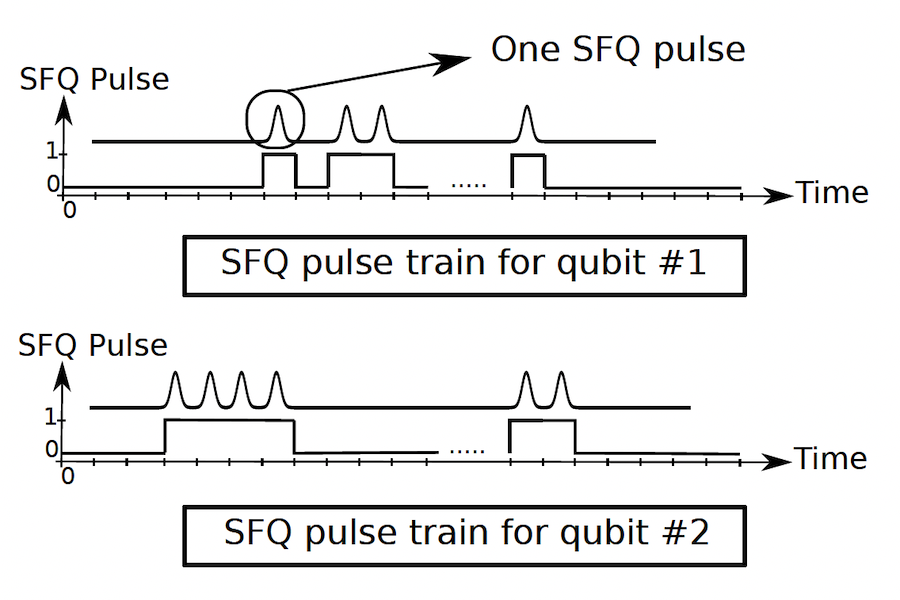
UChicago researchers found it challenging to realize SFQ-based two-qubit gates due to high leakage to non-computational subspace of the qubits. Here, the computational subspace includes the first two energy levels of the qubit, and leakage is the probability of measuring the qubit in a higher energy level at the end of the gate.
“However, realizing low-leakage SFQ-based two-qubit gates is possible by carefully engineering the quantum system and optimizing both software and hardware,” said Mohammad Reza Jokar, a Ph.D. candidate at the University of Chicago and co-author of the QCE paper.
Prior work on SFQ-based single-qubit operations focused on minimizing the leakage at the end of the quantum gate, which leads to low-leakage gates. However, this strategy does not work well for SFQ-based two-qubit operations. UChicago researchers found that without active suppression of the leakage during the execution of the SFQ-based two-qubit operations, leakage occurs that will not be captured by their model.
Thus, at the software level, researchers modified existing quantum optimal control methods to actively suppress the leakage during the quantum gate by modeling one extra energy level and penalizing the leakage to that energy level after applying each SFQ pulse. In addition, they expanded the solution space and accepted solutions that are accurate up to single-qubit rotations around the Z axis; such solutions are acceptable because Z rotations can often be commuted through subsequent operations or implemented virtually. By expanding the solution space, they were able to find SFQ pulse trains with lower leakage.
At the hardware level, the researchers examined different qubit architectures for their potential advantages. In addition to transmon, which is a widely used qubit, they studied fluxonium, which has high anharmonicity and is designed to naturally suppress leakage. They also studied the impact of using inductive coupling instead of capacitive coupling, and showed that it can help realize two-qubit gates with low leakage and short quantum gate time. Finally, they studied the impact of tip angle, a parameter that determines the amount of energy deposited per each SFQ pulse. Smaller tip angle allowed for more fine-tuned control of the SFQ pulse trains which helped realize better quantum gates with lower leakage.
The results presented in the paper show that it is possible to realize SFQ-based two-qubit gates with gate error and gate time similar to microwave-based gates, after carefully engineering an SFQ-friendly quantum system. These results indicate that SFQ is a promising approach for quantum control as it can deliver scalability as well as low-error quantum operations.
“In this paper, we study the practical implications of realizing SFQ-based two-qubit gates,” said Jokar. “One key next step is to design an in-fridge controller architecture as well in order to have a complete controller system.”




